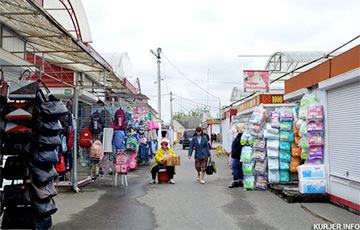Slutsk Sole Trader: Never Had It For 24 Years Of My Work
39- 20.10.2017, 10:39
- 127,039

Sole traders work only at weekends.
On weekdays there are not a lot of people at the Slutsk market. The sellers say that the reason is not in the days of the week and rainy weather, but in small salaries of customers and competitors – Asian stores, second-hand shops and shopping centers. The market sellers cannot offer their customers goods in installments, as shops do.
Courier has inquired how sole traders live in Slutsk.
On weekdays, not all the sales outlets work. Some sole traders have dismantled and removed their rolladens from the market, as they left the small business because of non-recoupment. Others open only at weekends, as on these days a few more people come for shopping.
"If some sole traders used to pay rent for a month, now they are able to pay only for 14 days. They basically work at weekends, when there are more buyers than on weekdays," – the sellers say.
The market survives due to Salihorsk residents
"People have no money. Sometimes you do not know where to get money to go for the goods. If Slutsk residents have no money and they do not buy anything from you, then, accordingly, there is no money for the trip itself, not to speak of the goods. Of course, there are fears that over time the market will die out, but so far those who are stronger, work, and who are weaker – they drop out," – seller Maryna says.
Her colleague Hanna believes that Slutsk residents have become impoverished. "For 24 years of my work at the market, there has never been a year like this one," – she says.
As an example, Hanna reminds the sales season before September 1. If earlier, she says, children were bought everything new for the beginning of the school year, it was not the case this year. "Parents just washed the clothes, patched them up, bought something at sales, – the seller says. – Can you remember the times when cucumbers and tomatoes cost a ruble and a half and a roll as much as that? We are not trading now, we are just plainly sitting."
Hanna Krysko, owner of showrooms with clothes, supports colleagues. According to her, the city-forming enterprises (meat processing plant, cheese producing factory and others) work 3-4 days a week. Where can people with such job get high salaries?
Hanna shows her calculations: 1.5 years ago she was buying goods for $ 3000 each season, now - for $ 1000. This means, that the drop in demand, and therefore, the in purchasing power is three times as much.

Unfair competition
Hanna Krysko says that Asian stores has become the main competitors for most marketers selling clothes. According to the sole trader, they entice people with cheap, substandard things. As the example she gives the story of one buyer. He bought a T-shirt for 15 rubles in an Asian store, but after two laundries, it was good for throwing away. So he came to the market and bought a T-shirt for 20 rubles.
"Many of us have questions: Belarusian sole traders must have certificates and all accompanying documents for their goods. While if you ask a seller in an Asian store to show you a certificate or at least some document for his goods, he will show you nothing," – sole traders say with indignation.
Not only "cheap" stores - Asian, second-hand, outlets, make a competition to the market, but also some retail facilities, where the price of clothing is more expensive than on the market, but where you can buy it at a discount, in installments and with the Khalva card.
Have nowhere to leave
Vital Boika, a former entrepreneur, claims that small business is struggling to survive in the conditions of a permanent crisis.
"Many left because of rising taxes and excessive rent. Sole traders have to pay for a piece of bare asphalt on the Slutsk market as if for a well-arranged trading place," – Vital Boika tells.
He adds that, in addition to rent and taxes, sole traders pay in the NSSF (National Social Security Fund), pay 20% value added tax, pay for safety standards, for the import of goods into the territory of Belarus, for electronic declaring, for cash registers and their maintenance, pay transportation costs. And this is not the complete list, Vital Boika asserts.
Those who trade little and who are far from retirement are looking for a job. However, they honestly admit that they doubt they will succeed in this, because there is no work in Slutsk, they say. Others, whom trade brings at least a small profit, try to "keep afloat."
We remind that the March of Disgruntled Belarusians 2.0 will be held at Kastrychnitskaya Square in Minsk at 14:00 on October 21. The rally is against the impoverishment of the people and against lawlessness in the army.









